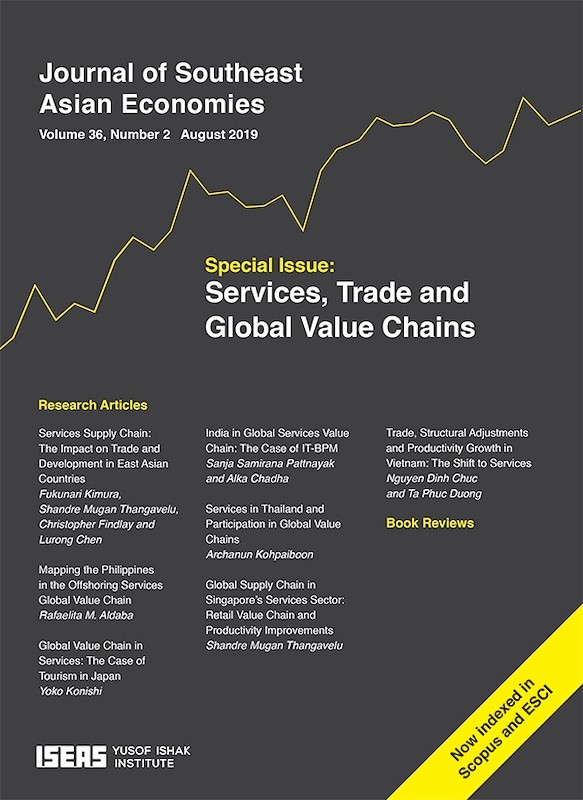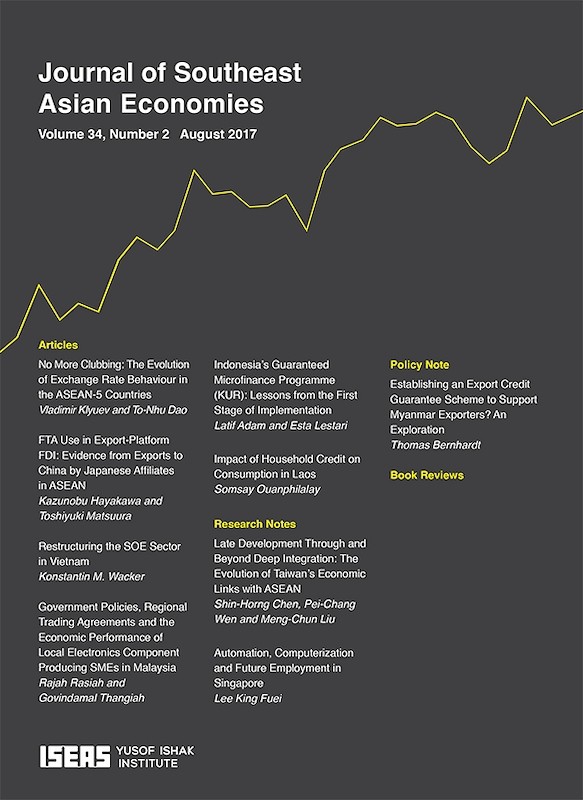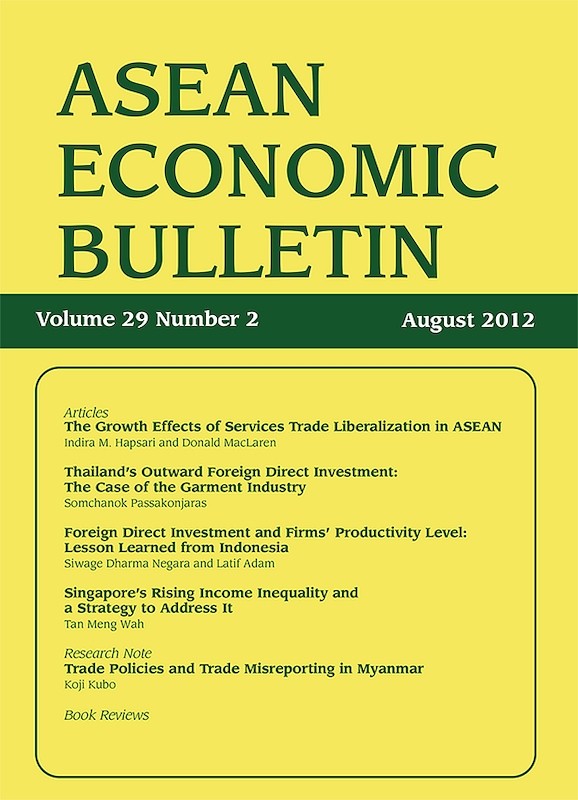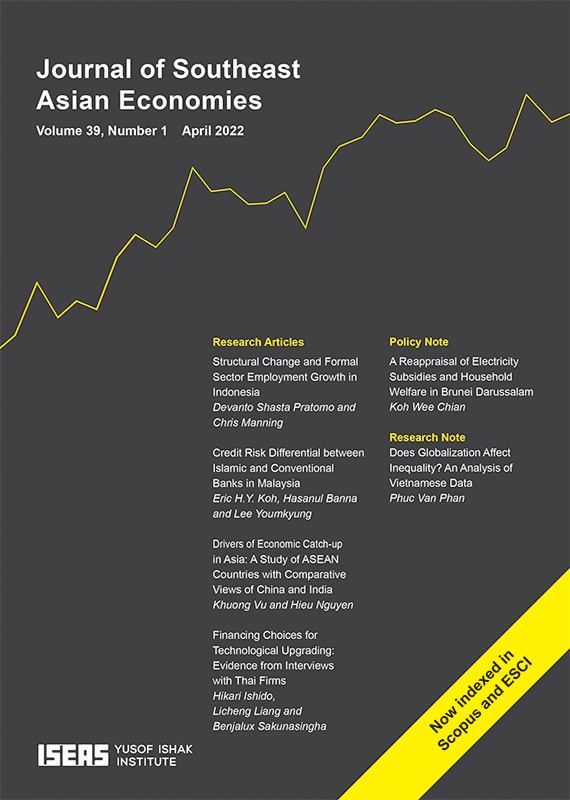Journal of Southeast Asian Economies Vol. 40/3 (December 2023)
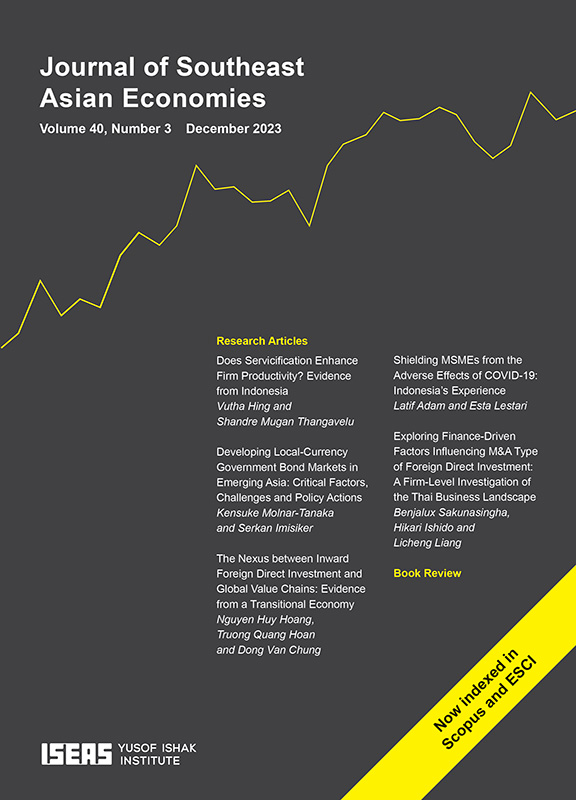
Date of publication:
December 2023
Publisher:
ISEAS – Yusof Ishak Institute
Number of pages:
106
Code:
AE40/3
Soft Cover
ISSN: 23395095
Contents
-
Journal of Southeast Asian Economies Vol. 40/3 (December 2023)
[Whole Publication, ISSN: 23395206] -
Preliminary pages
- ARTICLES
-
1. Does Servicification Enhance Firm Productivity? Evidence from Indonesia, by Vutha Hing, Shandre M Thangavelu, authors see abstractThis study quantifies the effect of servicification on productivity using firm-level data from Indonesian manufacturing industries. The empirical strategy employed involves two procedures. The first stage is based on the estimation of productivity from the Cobb-Douglas production function using a semi-parametric method. The second stage involves regressing the derived productivity with servicification, which is proxied by the share of industrial service cost to total input and the share of service revenues to total output. The results show that servification is positively related to productivity. The study also finds evidence of the importance of firm heterogeneity, i.e., foreign ownership and participation in global value chains (GVCs) in boosting productivity.
-
2. Developing Local-Currency Government Bond Markets in Emerging Asia: Critical Factors, Challenges and Policy Actions, by Kensuke Molnar-Tanaka, Serkan Imisiker, authors see abstractThis paper describes the growth of local-currency bond markets in Emerging Asia and the institutional and policy challenges facing the region’s economies for their further development. It presents an empirical analysis of the relationship between local-currency government bond (LCGB) market development and the components of financial development, using panel data for selected Emerging Asian economies. The analysis seeks to identify the key determinants for the development of LCGB markets. The results show that the depth of and access to both financial markets and financial institutions have a significantly positive impact on LCGB market development. Critical factors associated with local-currency bond market depth include macroeconomic variables, the exchange-rate regime, capital account openness and creditor rights. Based on these results, the paper offers policy directions for fostering the development of local-currency bond markets in the region.
-
3. The Nexus between Inward Foreign Direct Investment and Global Value Chains: Evidence from a Transitional Economy, by Nguyen Huy Hoang, Truong Quang Hoan, Dong Van Chung, authors see abstractThis study aims to empirically explore the nexus between foreign direct investment (FDI) and other factors for global value chain (GVC) participation (backward and forward) in Vietnam, a transitional economy. The estimation shows that the economic size and market development of Vietnam and its trading partners are the main determinants of the nation’s GVC participation. Inward FDI flows into the country have a positive impact on its GVC participation in both forward and backward linkages. Geographical distance is an impediment to Vietnam’s backward GVC participation, whilst engagement in free trade agreements is advantageous to its GVC participation in both backward and forward linkages. We find that the logistics performance of Vietnam and its trading partners also positively affects the country’s GVC participation. The paper provides policy implications for Vietnam to better use FDI and other factors to enhance its GVC participation, such as by attracting large supplier firms in upstream industries across the multinational enterprises’ (MNEs) value chains, promoting trade liberalization and improving logistical efficiency.
-
4. Shielding MSMEs from the Adverse Effects of COVID-19: Indonesia’s Experience, by Latif Adam, Esta Lestari, authors see abstractThis paper examines the Indonesian government’s policy response under the PEN (National Economic Recovery) programme aimed at assisting MSMEs during the COVID-19 crisis. The findings show that the scheme significantly benefited the enterprises. Credit restructuring and interest subsidy programmes offered critical assistance to the beneficiaries and improved their access to credit options. Moreover, the Productive Government Assistance for Micro Businesses (BPUM) initiative enabled the beneficiary enterprises to address emergency working capital needs required during the pandemic. However, this study also identifies several hurdles that reduced the effectiveness of the PEN programme. These challenges could have been overcome by striking a balance between banked and unbanked MSMEs, maintaining reliable databases for targeted recipients, and strengthening coordination between the various agencies involved.
-
5. Exploring Finance-Driven Factors Influencing M&A Type of Foreign Direct Investment: A Firm-Level Investigation of the Thai Business Landscape, by Benjalux Sakunasingha, Hikari Ishido, Licheng Liang, authors see abstractThis study explores the finance-specific factors that help domestic companies operating in Thailand receive foreign direct investment (FDI) related to mergers and acquisitions (M&A). The three main objectives of this paper are to: analyse whether the firms receiving FDI differ from those that do not; identify significant finance-specific determinants that make Thai companies more likely to receive foreign investment; and explore the heterogeneity (different responses to investment decisions) at the firm-level, and the impact of financial constraints. This research makes use of the operational and financial data of both listed and unlisted Thai companies over the 2012–20 period and finds that larger as well as younger firms draw more foreign attention and have a higher probability of receiving M&A type of FDI. Moreover, companies with substantial intangible assets attract more investments from abroad. These findings have practical implications for business policies related to the accumulation of intangible assets. Specifically, developing flexible formal/informal linkages with potential M&A partners is key to promoting M&A-type FDI.
- BOOK REVIEW
-
BOOK REVIEW: Risk and Resilience in the Era of Climate Change, by Vinod Thomas., by Shreekant Gupta, author

